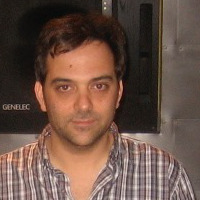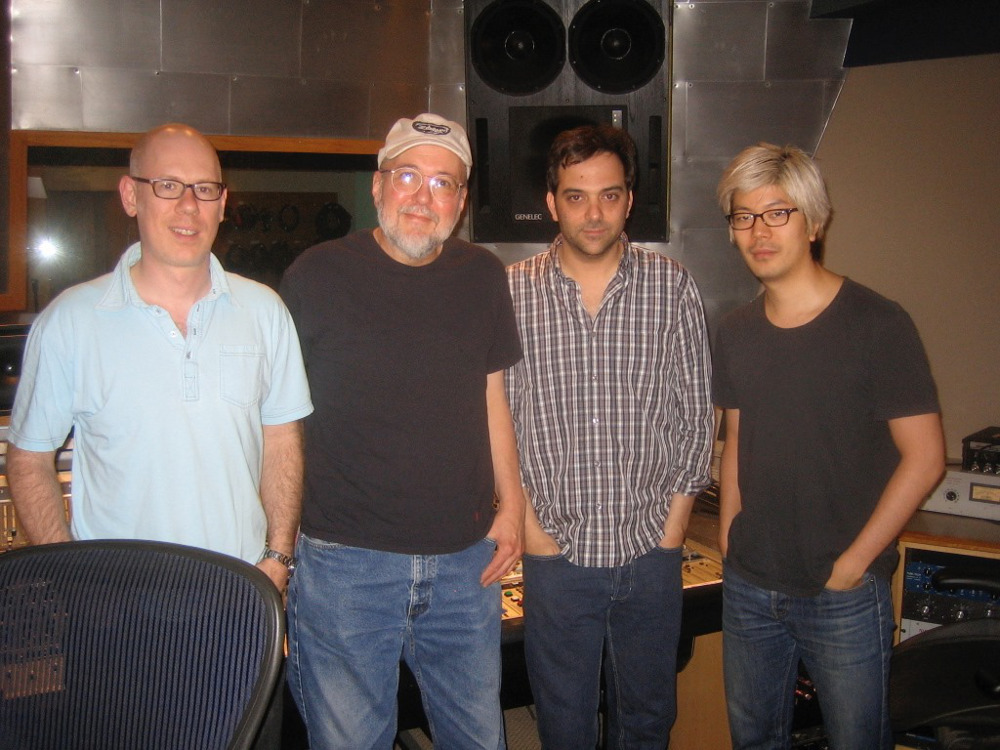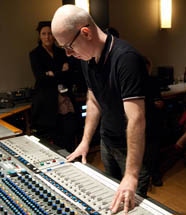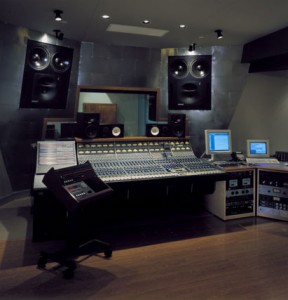The Secret to Adam Schlesinger’s Success: His Life in the Studio
Adam Schlesinger was an amazingly gifted songwriter, with so many sides.
One of those very important sides was how well he worked in the studio. When he passed away far too soon on April 1 of coronavirus-related symptoms at the age of 52, Schlesinger had compiled an almost unbelievably prolific output of recorded music. He co-founded Fountains of Wayne, Ivy and Tinted Windows, wrote the title track to Tom Hanks’ That Thing You Do, penned for Broadway via John Waters’ Cry-Baby, produced America, the Monkees, and Dashboard Confessional, turned TV into twisted musical theater on “Crazy Ex-Girlfriend,” and so much more than can be listed here.

Adam Schlesinger passed away on April 1, 2020, leaving behind a multifaceted music legacy. (Photo courtesy of Stratosphere Sound).
To put it succinctly, Schlesinger simply blazed a massive trail through modern music. And from self-recording his demos in a West Village apartment to co-creating one of New York City’s coolest recording studios ever in Stratosphere Sound, Adam understood audio very well.
Many talented engineers, mixers and producers had the privilege of being on hand when Schlesinger worked his craft, in the studio or touring live on stage. Among that group is Grammy Award-winning engineer/producer Geoff Sanoff, who was chief engineer at Stratosphere for 13 years. Many of Sanoff’s career highlights came in the service of Schlesinger, including working with Fountains of Wayne, Ivy and Tinted Windows, Steven Colbert’s “A Colbert Chirstmas:The Greatest Gift of All!”, Dashboard Confessional and the soundtrack of Music and Lyrics. Sanoff currently works out of Steven Van Zandt’s Renegade Studio, where he’s worked with Darlene Love, Steven Van Zandt, Jesse Malin, the score for Lilyhammer and many artists on Van Zandt’s Wicked Cool label like Wildlife, Soraia and the Jellybricks.
Sanoff spent countless sessions observing Adam Schlesinger’s best studio practices. Below, Sanoff shares with SonicScoop many of the powerful lessons he gleaned from an unassuming genius talent.
Maintain Sane Hours
Adam had an incredible work ethic, but it didn’t always read that way because he was also a very social person. He liked to go out and party, and hang out with people. But he wasn’t the last guy at the party either — he would always cut out at the right time. He was kind of a genius in that respect. It was really good for him career-wise because he was always meeting new people.
But in the studio (Stratosphere Sound) he would often be in at 9:30 AM the next day, and if I got in at 10 he usually had already gotten there ahead of me. He’d be listening to what we’d been working on, and making some mix adjustments, or just thinking about it, or playing guitar. But he would almost always cut out between seven and eight on any given day, and a lot of times a little earlier.
It was pretty much like Nashville is, but in a good way. For me, having worked in studios and with other producers who had much longer days, it was eye opening for me to see. As Adam once said to me, “You can get as much done in 8 to 10 hours as you can in 12 if you don’t spend your time fucking around…Just come in and be focused and then you can go have dinner and a night out and everyone doesn’t get burned out as fast.”
This method has really held up for me because then people enjoy those sessions. Adam was always good at getting along with the bands, good at communication and good at making sure we had a fun time.
Have An Incredible Ear
Another thing about him was that he had this incredible ear, and his timing was flawless—I never had to worry about that at all. His pocket was just phenomenal. Though he was definitely hard of hearing from his years of rock. I used to wear earplugs to do bass overdubs because he’d turn it up so loud. It was like he was the deafest guy with the sharpest ears.
For example about his ear, I would be working with a vocal on a song that he had written, for a commercial or a band, and he’d come in and check to make sure it was right. He might say, “Oh that passing note there, it makes sense that you turned it to a D because that also works, but it’s supposed to be a C#.” He would catch every little detail about a vocal, especially if it’s something he wrote–he had worked out that melody like down to the syllable.
And he never missed a note when it came to getting the singer to do what he wanted or tuning or editing. Working with someone who could hear melody with such precision was a real motivator to me. It made me want to learn to have the same superpower–to hear the smallest detail–just so I could keep up with him.
For the “Crank Yankers” TV show, I worked on a few of them with him and (composer) Steven Gold. I remember we had a CD that would sit around the studio of just stuff from those sessions. We listened to it endlessly, and it became a reference point for inside jokes.
We’d take breaks listening to that CD or watching the latest YouTube gag video, and while we’d all be sitting around laughing, it only recently occurred to me that Adam was also taking notes. He was a real student of many genres and disciplines, and he not only enjoyed laughing, but I think he actually enjoyed thinking about how comedy works.
He had this real mind for trying to figure out why any kind of music works. If he got hired for a commercial he could say, “Oh do Britney Spears, OK.” That was not a problem. He could imitate stuff flawlessly. So easily in fact, that for someone like me, who came from a place where music was something that was supposed to involve sweating blood, it took me a while to appreciate both the depth of his talent, because he made hard things seem easy, and the fact that you don’t have to kill yourself to make great things. Sometimes it’s the easy stuff that’s actually the best. The Ivy song “Edge of the Ocean is a great example of that.
The Arrangement is Everything
His primary singular vision was as a songwriter. But working with Adam was the first time it ever dawned on me that the secret of mixing is the arrangement. The arrangement is 90% of it. If you get the arrangement right, the rest of the song just falls into place.
That was an intuitive thing for him. Because he had the music stuff just so dialed in in his brain. It’s like he was playing the chess match in his head or something, and I think he just had kind of already solved a lot of those problems at a much younger age.
A good example of that might be the Tinted Windows record. There was so much time and thought put into that record.
HAVE A STUDIO VISION EQUAL TO STRATOSPHERE SOUND
Stratosphere Sound was one of those places where people would still interact with people that they didn’t know. The vibe in that place that all three of them (co-owners Schlesinger, Andy Chase and James Iha) were kind of trying to balance the business side of it with the clubhouse vibe. For Adam, hanging out was a big part of that. And why would you want your studio to be a lame place anyway? You wanted it to be a cool place to be in.
Around that time period, studios were still renting out the good stuff. Like, if you rented a studio and you wanted a new U 47 that was another $100 a day, or if you wanted a really great guitar and bass. But Stratosphere never charged rental fees like that. James had all these keyboards, just for one thing. It was like, “It’s here for you to use it. We want you to have fun!”
Stratosphere was a perfect place in a lot of ways because you have the balance of the smaller more affordable rooms and a really perfectly done control room, and all the gear. And because Adam also was always around, if you needed to play something and you’re like, “This would be great with piano,” he might jump in on it.
Another part of his process was that he was always burning CDs, even after I’d wired the boombox upstairs so you could run a mix directly into it from the control room. He just found it easier to burn CD’s I guess. Adam is probably single handedly responsible for at least one metric ton of CDs. He was just nonstop burning CDs with some cryptic notation on what the mix was. While all those wasted CD’s used to drive me nuts, I knew that that constant listening and changing of perspective was a crucial part of his process, and that’s another lesson I’ve taken with me.
BE ABLE TO LEVEL UP HUGH GRANT
One of the most impressive examples of producing that I ever saw from him in the studio was on the soundtrack for (the 2007 film starring Hugh Grant and Drew Barrymore) Music and Lyrics. We’ve been in the studio off and on with Hugh Grant for a couple of weeks recording tracks including the (Schlesinger-penned) main song, “Way Back Into Love.” (Visit here to see the 2009 SonicScoop interview with Adam Schlesinger on creating this song, plus his work with Tinted Windows.)
Hugh Grant worked really hard, and he could carry a song, but he wasn’t a singer and he didn’t speak music. He spoke “actor.” So Adam figured out how to communicate with him and it was pretty much a master class on how to get something done.
Grant learned the melodies that we gave him: We would always do a rough demo first with someone else singing, and then he would learn that like an actor learns lines. He did that really well with most of the stuff, he could usually do it pretty quickly. We got to this point where the song was mostly done, but the realization emerged that, “Oh shit, you know what? This song needs a harmony, and the right harmony is actually not for the woman to go up high, it’s for the man to go up high.”
So we had to bring Hugh back in (to Stratosphere Sound) and do this thing on the fly. But Hugh hadn’t studied that part, and it might have been on the edge of his range anyway. So there was no reason why he would be able to just kind of sing that harmony right away.
In the end, the way that it actually got done was what I call—and this is not a reference to Hugh at all—but “Monkey See, Monkey Do.” Adam was singing acapella with no music, and then he had Hugh sing his part right back to him while we recorded it all. It took a brain like Adam’s to understand what it takes to be an actor, so he could get Hugh up to speed quickly and get his part in the ballpark. I still can’t believe that worked as well as it did.
MAKE AN EPIC IMPACT
I think so many people are paying tribute to Adam now because, for one thing, he had a lot of friends. And when I say “a lot of friends” I mean a lot of people who genuinely loved the guy, and I’m happy to include myself in that category.
Adam touched so many people in different areas, from the rock world to the TV world to the commercial world to all the comedians to this sort of highbrow East Coast cultural world to LA. He just had an entree into a lot of different worlds that were culturally vibrant–those people are the people that, when they lose one of their own, they talk about it. And for many of us as well, he wanted us to succeed. We lost not only a friend and colleague, but also someone we can thank for career opportunities he made possible.

(l-r) Geoff Sanoff, Bun E. Carlos, Adam Schlesinger, and James Iha (Photo courtesy of Stratosphere Sound)
As a writer, he wrote about stuff that I think really connected with people. “Hey Julie” (from Fountains of Wayne’s Welcome Interstate Managers album) is just this really nice modest, touching thing, or the sadness of “I-95” (from Fountains of Wayne’s Traffic and Weather,” those are things that kind of connect with everybody.
One of my favorites on the last record, was a song with a bit more of an overt personal reference, which was rare for him, and which I appreciated for its revealing something about himself. The song called “Radio Bar” (from Fountains of Wayne’s Sky Full of Holes album – visit here to see the SonicScoop interview with Adam Schlesinger on making the album) is about a bar (WXOU Radio Bar in NYC’s West Village) where we all used to hang out. That’s also where he met his former wife. I just love it because it’s a song everybody understands: about falling in love in some random place, but it also captures some highlights from our shared past.
With Adam’s passing, we lost somebody who had this really charming way of expressing people’s inner lives in a way that brings people together. He could express the common experience people share, of being a certain age or going through certain experiences, without having maybe even lived it himself.
Adam could do it in a way that made the cultural critique move forward, without necessarily being about the cultural critique. That’s a gift, because it’s understanding and maybe funny, but without being too judgmental–and it’s also fucking catchy.
— by David Weiss; Geoff Sanoff can be reached at gsanoff@mac.com. “
Please note: When you buy products through links on this page, we may earn an affiliate commission.









[…] One of those very important sides was how well he worked in the studio. When he passed away far too soon on April 1 of coronavirus-related symptoms at the age of 52, Schlesinger had compiled an almost unbelievably prolific Read more… […]